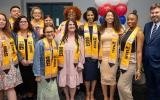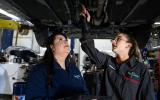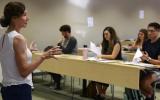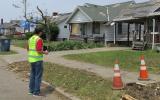Programs and Disciplines

For the first time in its 57-year history, Dallas College is graduating a class of bachelor’s degree students this year. This occasion marks a pivotal moment for more than 100 students at one of Texas’s largest community college systems, which previously offered associate degrees as its highest degree credential. The program presents students with a life-changing opportunity via a full tuition scholarship and career pathway toward a $60k first-year job. Furthermore, this innovative program attracted the attention of the Bezos Foundation, resulting in the launch of a tuition-free, on-campus...

As apprenticeships gain momentum in higher education across the U.S., students are finding that these opportunities are the perfect springboard into a career they love while businesses are receiving qualified employees who can make a quick transition into their workforce after graduation. And community colleges are the vehicles that bring everyone together, making apprenticeships a win-win-win for everyone involved.
Moraine Valley Community College offers students in its Automotive Technology Program an apprenticeship opportunity through a unique partnership with Nissan North America, Inc. In...

San Diego Mesa College is partnering with San Diego Unified School District, San Diego State University (SDSU), and National University to mold a new generation of K-12 educators from diverse backgrounds who reflect the students they teach. The Teacher Pathway Inclusion Program was launched in April 2019 and includes a bevy of support services to create a seamless route for high school students to earn a bachelor of arts degree and teaching credential, with an emphasis on filling a growing need in science, mathematics, and special education. Mesa College aims to enroll 50 students...

The Unmanned Aerial Systems (UAS) team at Sinclair Community College is dedicated to creating one of the most comprehensive and pioneering facilities in the nation for the advancement of the UAS industry. Since 2008, Sinclair has been at the forefront of UAS innovation, creating partnerships, developing leading curriculum, and investing significantly to establish a nationally prominent program dedicated to meeting workforce needs. The team members never dreamed they would be called upon to respond to one of the most devastating storms to ever to affect the Greater Miami Valley in southwest...

Communication faculty often have a unique opportunity to hear students’ own stories. These stories permeate the work of learning public speaking. Faculty members at Pellissippi State Community College recently launched In Our Words, a public forum in which students share their stories with audiences beyond the public speaking classroom. Public speaking generally benefits both speaker and audience, and In Our Words certainly does that. Benefits also extend to the Communication Studies department and other areas of the college.
Process
Pellissippi State has, for years, had a robust faculty...
2015
Tags:
November
2014
Some might say that the most important part of Tallahassee Community College's (TCC) new Wakulla Environmental Institute (WEI) is already complete. After all, the breathtaking natural spaces that define TCC's recently acquired 158-acre property in rural Wakulla County, Florida, are destined to become the institute's most widely used classrooms. Nevertheless, it was with great excitement that the college broke ground for the institute's first building in April of 2013.
TCC President Jim Murdaugh and WEI Director Bob Ballard—with the help of TCC trustees and local and state dignitaries—...
Tags:
October
2014
To gain insight on how educators can better prepare students for advanced manufacturing and STEM careers, the Sierra College Science, Technology, Engineering & Math (STEM) Collaborative engaged Elizabeth Dayton, Ph.D., to conduct a literature review on the value of adding the arts to STEM, making it STEAM. The resulting white paper, Exploring STEAM: Science, Technology, Engineering, Arts, and Mathematics (Dayton, 2014), is now available on the Sierra School Works website.
Requests from manufacturing advisory committee members for graduates who are innovative and critical thinkers led...
Tags:
July
2014
The proliferation of composite materials used in our aerospace, transportation, infrastructure, and recreation sectors is creating a growing need for waste management and sustainable practices. Couple this with current and pending legislation, and it becomes clear why businesses need to focus on new recycling technologies. Although many companies have extensive research and development efforts underway, including both reclamation and re-use of composite materials, training people for careers that utilize recycling technologies is new for educational institutions.
One college helping to lead...
May
2014
Step UP is a grassroots program that evolved from the 25 member, cross-functional Developmental Education Committee that, in 2003, sought to create a program to improve the success and retention of developmental education students. The objective was to design a program at Howard Community College (HCC) that would provide positive support and encouragement to students as they make the often difficult transition and adjustment to college. After researching programs and interviewing students, a model for Step UP was created.
The program was piloted with five coaches and students in spring 2005....
May
2014
The engineering technology (ET) program at Del Mar College recently received a significant boost with the approval of a grant for $332,267 by the Jobs and Education for Texans (JET) Advisory Board, chaired by Texas Comptroller Susan Combs. The funds will be used to purchase equipment to train students for high-demand jobs in fields such as automated manufacturing, energy production, and refining.
"The grant is very important to our ET program," said Larry Lee, the college's Dean of Business, Professional and Technology Education, who led the grant team-writing effort. "Major industries are...
Tags:
April
2014
On the second floor of an otherwise unassuming office building in Bellevue, WA, Donna Hudson is leading a lecture on environment and community. It's the type of scene you'd expect to see in a movie depicting college life: The professor asks a question of the class and in short order, a lively discussion is underway that quite possibly brings up more questions than are asked. It's the kind of student-teacher rapport most of us rarely get to experience—let alone on a regular basis.
As class progresses, however, it becomes clear that this class is more than just a picture-perfect college...
Tags:
April
2014
While many people dream of turning their good idea into a bestselling product, Colfax High School engineering and design students are off to a quick start because their Fast Forward ski sensor idea is going through the design process with Quirky. The New York based company makes invention accessible by reviewing as many as 4,000 ideas per week from inventors all over the world, and using a community selection and development process to bring the best ideas to market. A limited number of the ideas make it through the first stage so being chosen for evaluation by Quirky was a rare honor for...
Tags:
April
2014
From left: Brett Mellington, LEDA Manager, Business Development and LCTCS Board member; Bud Barrow, CEO, Our Lady of Lourdes Regional Medical Center; Kathy Bobbs, CEO, Regional Medical Center of Acadiana and Women's & Children's Hospital; Laurie Fontenot, Dean of Nursing, Allied Health, and Safety, SLCC; David Callecod, President/CEO, Lafayette General Health; Dr. Natalie Harder, Chancellor, SLCC
A new program at South Louisiana Community College (SLCC) will help fill a growing need within Acadiana's healthcare industry. SLCC administrators, along with the Lafayette Economic Development...
Tags:
2014
This document in the final report of the League for Innovation's Community Colleges and Public Health Project, published in fall 2014. It provides background on the role of community colleges in education for public health and provides two broad curricular models for community college certificate and degree programs, including "Public Health Generalist and Specializations" and "Health Navigators." The project was initiatied in partnership with the Association of Schools and Programs of Public Health (ASPPH) Framing the Future task force.
Tags:
2010
This guide is a product of the League's Significant Discussions Project, and was created to facilitate discussions between secondary and postsecondary faculty and administrators, and business, industry, and community partners. The Significant Discussions guide is a comprehensive set of tools to assist these partners in their collaborative work to better align curriculum across institutions, thus easing student transitions from high school to community college and university transfer. The guide is based on effective practices in place at nine participating sites and promising practices...
2008
The League's College and Careers Transition Initiative (CCTI) engaged high schools, community colleges, and businesses in a process to improve career and technical education systems, programs, strategies, and outcomes. This monograph reports on examples of these systems changes that resulted from CCTI participation: expanded use of career pathways; improved academic instruction; improved CTE instruction; measures to improve college readiness; high school-college partnerships and articulation; education-business partnerships; advising and student success initiatives; and data-driven decision ...
2007
As the centerpiece of conferences and federal initiatives across the educational spectrum, career pathways could be seen as be the latest fad offering community colleges the promise of increased funding and student success. In contrast, the authors of this paper contend that career pathways are the building blocks of a critically needed systemic transformation that will position community colleges as leaders in the effort to address some of the most pressing economic and social concerns facing the country today--not as a short term fix or project, but as incubators of innovation capable of...
2007
Community colleges are uniquely poised to prepare tomorrow’s teachers to use internet-based tools and curriculum resources to enhance learning. Through the U.S. Department of Education-funded Pathways project, almost 250 faculty from over 40 community colleges nationwide have incorporated new tools and resources into their courses while modeling best practices in technology-based instruction to their students; approximately 6,900 preservice teachers have been affected by this program.










